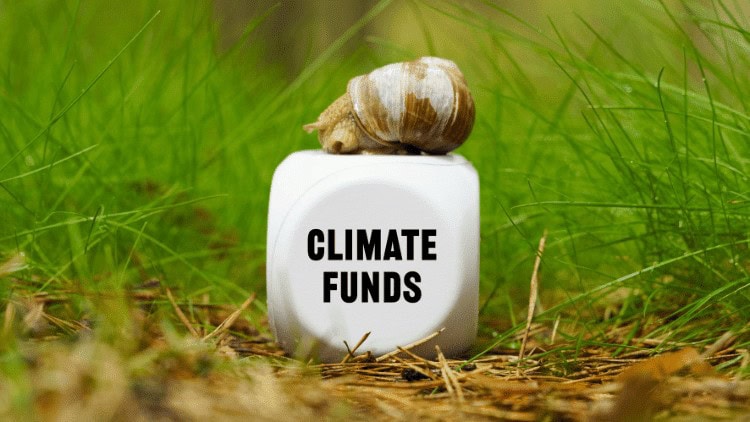The June summit promised to catalyse a revolution in climate finance but concluded without a single firm commitment.

The recent Paris Summit for a New Global Financing Pact was touted by its organisers, including the French president, Emmanuel Macron, as a groundbreaking initiative to forge a ‘new contract’ between the global north and south that would address climate change and foster sustainable development. The fact that most G20 leaders did not even bother to show up, however, casts doubt on the feasibility of the effort.
Despite the participation of roughly 50 heads of state, high-ranking representatives of international institutions, private-sector executives and climate experts, the summit did not live up to its lofty promises. It failed to introduce the necessary measures to narrow the climate-finance gap, provide lower-income countries with the fiscal space they need to weather the current debt crisis and overhaul the global financial architecture.
Shockingly, the summit concluded without a single firm commitment. This can be attributed to the opaque and unequal preparatory process, which lacked adequate consultation with low-income countries and civil-society groups and thus failed to create the conditions for forging new global policy frameworks. Ahead of the Paris meeting, the Club of Rome’s Earth4All Transformational Economics Commission published an open letter identifying four critical issues that leaders and policy-makers must address. Unfortunately, there has been little progress on any of them.
Failure to deliver
Climate finance is a case in point. Rich-country leaders’ failure to deliver on their 2009 pledge to provide developing countries with $100 billion in annual climate financing has significantly delayed necessary investments and undermined global co-operation. The summit’s concluding statement, ‘The Paris Agenda for People and the Planet’, states that developed countries will finally meet their climate-financing target this year—a dubious claim, given that the conference ended with no new financial commitments.
In recent years, donor governments have overestimated their climate-finance spending, claiming to have mobilised $83.3 billion in 2020 when the actual figure was closer to $24.5 billion. Compounding the problem, most of this support was provided through loans rather than grants, exacerbating the debt burdens of low-income countries. Moreover, as a recent Reuters investigation has revealed, the vagueness of the term ‘climate finance’, together with the absence of a system to track these funds and their impact, has allowed billions of dollars to be directed toward fossil-fuel-related projects and other investments that have nothing to do with reducing emissions.
Although the global debt crisis has widened the climate-finance gap, the Paris summit failed to tackle the problem. With more than 70 developing countries in dire need of debt relief or already in default, global leaders offered no concrete proposals for improving the International Monetary Fund’s Global Sovereign Debt Roundtable or the G20’s Common Framework for Debt Treatments, neither of which has yielded the expected results. The only relevant development to come out of the meeting was the announcement of a $6.3 billion debt-restructuring deal between Zambia and its creditors, which does not include any debt reduction.
Conspicuously absent
While failing to meet their own obligations, global leaders overemphasised the private sector’s role. Although private investors control more than $210 trillion in financial assets, only a small fraction of this is invested in lower-income countries. Moreover, the financial sector’s predatory lending practices have increased the debt burdens of already-distressed countries across the developing world.
These issues were conspicuously absent from the discussions during the Paris summit, perhaps because Macron’s advisers included BlackRock and Amundi, two of the worst offenders. Both firms have consistently rejected requests for debt relief from countries such as Ethiopia, Ghana, Sri Lanka and Zambia, insisting on full repayment despite benefiting from higher interest rates. BlackRock, which holds $220 million of Zambian sovereign bonds, could generate $180 million in profit for clients if the country paid its debts in full—a 110 per cent return on its investment.
A reallocation of special drawing rights, the IMF’s reserve asset, offers a cost-effective way to provide lower-income countries with critical financing. While the Paris summit’s organisers claimed to have achieved the target of recycling $100 billion of SDRs from advanced economies to vulnerable countries, this statement is misleading. The United States’ pledge to contribute $21 billion worth of SDRs, for example, is contingent on congressional approval.
The main channels for SDR recycling are expected to be the IMF’s Poverty Reduction and Growth Trust and the Resilience and Sustainability Trust (RST). So far, however, neither fund has disbursed any recycled SDRs. While Rwanda, Costa Rica and Barbados are supposed to receive disbursements from the RST soon, it will likely take years to re-channel the full $100 billion. Meanwhile, summit participants barely discussed the SDR allocation process, which relies on outdated and unfair IMF quotas.
Taxation excluded
In the absence of alternative measures, lower-income countries have little choice but to raise taxes to boost government revenues. But the Paris agenda includes only a generic statement on promoting international co-operation to explore new avenues for international taxation and for combating illicit financial flows. Regrettably, wealth taxation was excluded from the official agenda, along with proposals for global taxes on financial transactions, windfall profits and multinational corporations. Even the idea of a global tax on carbon emissions from shipping was ignored.
The Paris summit was supposed to catalyse the transformation of the international financial system. But its failure to address the urgent needs of the world’s most vulnerable countries puts it in the same league as other recent missed opportunities, such as the IMF and World Bank’s spring meetings and the G7 meeting in Hiroshima.
A just transition to a low-carbon economy is the only way forward. But even as the planet continues to heat up and inequality and poverty rise, governments in the global north are stalling. As we approach the G20 meeting in New Delhi in September and the United Nations Climate Change Conference in Dubai (COP28) in November and December, we must hold governments and financial institutions accountable and demand urgent and radical climate action.
Republication forbidden—copyright Project Syndicate 2023, ‘Why the Paris financing summit failed’



